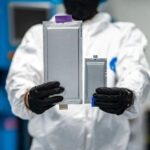Researchers from Harvard University have successfully tested a new solid-state battery with a lifespan longer than conventional electric vehicle batteries and can be fully charged in just 10 minutes.
Researchers from the John A. Paulson School of Engineering and Applied Sciences (SEAS) at Harvard have developed a solid-state battery that can be fully charged in just 10 minutes while having a lifespan of over 6,000 charge cycles.
This solid-state battery uses a lithium metal anode instead of graphite. Experts say that this change in the material composition allows the battery’s anode to store ten times the energy as compared to a graphite anode.
In addition, the new solid-state battery also incorporates tiny silicon particles (in micron size) to prevent the growth of dendrites on the lithium metal anode, thus minimizing the risk of short-circuiting or overheating.
The Harvard researchers conducted tests on a sample solid-state battery the size of a postage stamp. The results were surprising as the battery retained 80% of its capacity after 6,000 charge cycles, which is significantly higher than conventional lithium-ion batteries.
The breakthrough by the Harvard research team is their successful suppression of dendrite growth by using micro-sized silicon particles on the anode, limiting the reaction to the surface without penetrating deeper. The lithium is coated around the silicon particles, and since plating and stripping processes can occur quickly on a flat surface, the developed battery can be fully charged in approximately 10 minutes.
Prof. Li Xin, a material science expert at SEAS, stated: “The lithium metal anode is considered a breakthrough in battery technology because they have a higher energy density, ten times higher than the widely used graphite anodes, and can significantly increase the driving range of electric vehicles.”
The solid-state battery has a solid electrolyte, unlike conventional lithium-ion batteries that use liquid electrolytes. The solid-state battery has a higher energy density than traditional EV batteries, which helps increase the battery’s capacity while improving its weight and volume.
Toyota is one of the automakers actively developing solid-state batteries and recently announced plans to commercialize them within the next few years. These batteries will have a charging time of about 10 minutes and a driving range of up to 1,200 km.
Thái Sơn (Tuoitrethudo)
Reference: Carscoops
Top 10 Most Expensive Electric Cars in the World
The production of electric vehicles heavily relies on battery technology, which directly affects the value of the vehicle. Additionally, factors such as supply chain, assembly line, research, and development also play a role in making the proposed price of electric cars higher than those with internal combustion engines.





























.jpg)
.jpg)















